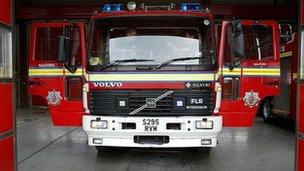False 999 calls cost fire crews millions
- Published

False alarms are a "drain on the public purse", Northumberland Fire and Rescue said
False alarms to fire and rescue crews are "draining" resources and increasing the risk of danger during real emergencies, fire brigades say.
Firefighters in the North East and Cumbria have responded to more than 28,000 false alarms in the last two years, the Βι¶ΉΤΌΕΔ has learned.
The calls have cost the Cleveland service about Β£11m since 2011, it said.
False alarms lead to "complacency" among businesses and prevent vital safety checks, crews said.
Firefighters from the Cleveland, Cumbria, Durham and Darlington, Northumberland and Tyne and Wear services have sent crews to 28,241 false alarms in two years, a Freedom of Information request revealed.
'Problem for business'
Cumbria responded to the fewest number of false alarms while the Tyne and Wear service dealt with the most.
The figures include hoaxes, 999 calls made with good intent that do not transpire to be emergencies and callouts prompted by faulty equipment in business premises.
Colin Baige, head of operational delivery at Durham and Darlington Fire and Rescue, said very few calls triggered by automatic alarms tended to be fires.
He said: "It's not just a problem for us, it's a problem for business. It can lead to a loss of production, a loss of sales and there's the reputation of the company to consider."
The Northumberland service said false alarms were a "drain on the public purse".
Lol Craven, from Cleveland Fire Brigade, said there was an increased risk of danger for staff at business premises that suffered regular false alarms.
He said: "Initially they expect the fire alarm to go off when there's a fire, so when they have persistent false alarms an air of complacency comes in.
"There is also an increased risk on the roads when we're responding under blue light conditions."
'Chasing the game'
Not all brigades in the region put a price on each call, but the Department for Communities and Local Government (DCLG) guidance itemises the average cost of responding to an incident at Β£1,970.
Mr Craven said charging for the callouts had been discussed but it was unlikely to be introduced as payments would be "onerous" to chase and could discourage necessary 999 calls.
He said education work with businesses was ongoing.
"As soon as we get rid of a problem at one premises we suddenly get another one or two elsewhere," Mr Craven said.
"We really are chasing the game."
Tyne and Wear Fire and Rescue Service said it monitored regular offenders and provided advice to try to resolve the problem.
- Published29 November 2012
- Published5 June 2012